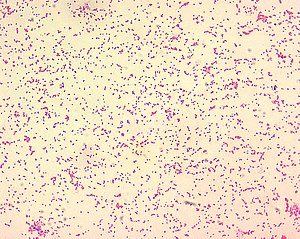Undulant fever
| Brucellosis | |
|---|---|
| Synonyms | Mediterranean fever, Malta fever, rock fever (Micrococcus Melitensis) |
 |
|
| Classification and external resources | |
| Specialty | Infectious disease |
| ICD-10 | A23 |
| ICD-9-CM | 023 |
| DiseasesDB | 1716 |
| MedlinePlus | 000597 |
| eMedicine | med/248 |
| Patient UK | Brucellosis |
| MeSH | D002006 |
Brucellosis is a highly contagious zoonosis caused by ingestion of unpasteurized milk or undercooked meat from infected animals, or close contact with their secretions.
Brucella species are small, gram-negative, nonmotile, nonspore-forming, rod-shaped (coccobacilli) bacteria. They function as facultative intracellular parasites, causing chronic disease, which usually persists for life. Four species infect humans: B. abortus, B. canis, B. melitensis, and B. suis. B. abortus is less virulent than B. melitensis and is primarily a disease of cattle. B. canis affects dogs. B. melitensis is the most virulent and invasive species; it usually infects goats and occasionally sheep. B. suis is of intermediate virulence and chiefly infects pigs. Symptoms include profuse sweating and joint and muscle pain. Brucellosis has been recognized in animals and humans since the 20th century.
The symptoms are like those associated with many other febrile diseases, but with emphasis on muscular pain and night sweats. The duration of the disease can vary from a few weeks to many months or even years.
In the first stage of the disease, sepsis occurs and leads to the classic triad of undulant fevers, sweating (often with characteristic foul moldy smell sometimes likened to wet hay), and migratory arthralgia and myalgia (joint and muscle pain). Blood tests characteristically reveal a low number of white blood cells and red blood cells, show some elevation of liver enzymes such as aspartate aminotransferase (AST) and alanine aminotransferase (ALT), and demonstrate positive Bengal Rose and Huddleston reactions. Gastrointestinal symptoms occur in 70% of cases and include nausea, vomiting, decreased appetite, unintentional weight loss, abdominal pain, constipation, diarrhea, an enlarged liver, liver inflammation, liver abscess, and an enlarged spleen.
...
Wikipedia
